Introduction
Wellness and healthy living involve the optimal state of different parts of the body, including the physical, mental, and emotional well-being of both the mind and the boy. Barring other factors, optimal health and wellness are critical to living long and disease-free.
An essential organ of the body is the skin. Not only is this organ the largest in the body, but it also protects organs in the body. The liver, kidney, and lungs are all essential organs, but they are not the first things you see when you meet them. It’s your appearance. It’s your face, your body. It’s your skin.
And although the skin is a barrier, regulates body temperature, and prevents dehydration, it is exposed to environmental hazards such as UV radiation, pollution, and harmful bacteria. Hence, it is an undeniable truth that your skin health must be given utmost priority.
There are several ways to ensure optimal skin health, such as staying hydrated, eating healthy, maintaining good hygiene, etc. However, the skin has some natural self-healing abilities and can rejuvenate. One of the molecules responsible for this is the antioxidant. As such, we will discuss the importance of antioxidants to the skin and every other important detail you should know.
What are Antioxidants?
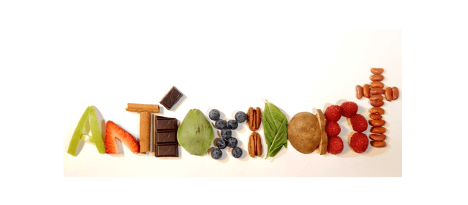
In very simple terms, antioxidants are compounds that
mop off free radicals
. Free radicals are highly reactive molecules produced by different processes in the body, including exercise, food metabolism, and exposure to several environmental factors, such as radiation, pollution, or cigarette smoke.
Free radicals can cause “oxidative stress,” triggering
cell and organ damage
. The damaging effects of these free radicals on the skin can damage cellular components, including proteins, lipids, and DNA. Hence the need for antioxidants.
Antioxidants mitigate free radicals
by donating an electron to stabilize them and prevent them from causing damage.
Let’s look at some impressive benefits of antioxidants to skin health.
The Benefits of Antioxidants For Skin Health
1.
Protection against free radicals
The most essential benefit of antioxidants is protection against free radicals. You will only understand these antioxidants’ importance when you discover how dangerous free radicals can be. As said earlier, free radicals, on the other hand, are
by-products as your body processes food and reacts to the environment.
And if your body cannot efficiently and successfully eliminate these free radicals, oxidative stress sets in. And oxidative stress can harm your body cells, organs, and tissues.
This explains why your body consistently produces enough antioxidants to counter free radicals.
Antioxidants help to boost your body cells’ protection
and support your system against oxidative stress that can harm your healthy cells.
2.
Reducing the Signs of Aging
Another impressive benefit of antioxidants is their ability to rejuvenate the skin. A
study
showed that vitamin C, an excellent source of antioxidants, may help improve the appearance of fine lines, hyperpigmentation, and wrinkles.
In another study, it was found that
antioxidants significantly improved skin elasticity
and reduced the appearance of wrinkles on the skin.
3.
Reduction of Inflammation
Inflammation is one of the ways your body reacts to injuries and infections. However, inflammations can quickly become a significant problem when they become chronic.
Antioxidants significantly reduce inflammation throughout the body, including the skin. They do this by mopping off
free radicals and unstable molecules that can damage the cells and cause inflammation
.
Free radicals can be generated by environmental factors such as UV radiation, pollution, and cigarette smoke, as well as by internal processes such as metabolism and immune function. They can all result in inflammations of different parts of the skin.
4.
Improvement of Overall Skin Health
Furthermore, antioxidants help to keep your skin youthful and radiant. To begin with, one of the reasons your skin ages very quickly is due to dryness. Dryness reduces the skin’s elasticity, so the skin structure breaks easily, leading to fine lines and wrinkles. The good thing is that
antioxidants have been shown to improve skin moisture
. They do this by forming a barrier to prevent water loss from the skin.
Moreso, dryness of the skin can result in you having dull and lackluster skin rather than a healthy, radiant glow. However, powerful antioxidants, such as vitamin E, have been shown to
stimulate oil production in the skin
. This helps to keep the skin moisturized and prevent dryness.
In addition,
antioxidants are crucial to producing collagen
in the body. Collagen is produced naturally by the body and is responsible for different functions, such as maintaining the skin’s elasticity, firmness, and youthful appearance. Antioxidants support the production of this impressive protein by impeding the action of free radicals.
In fact,
studies
have shown that some antioxidants, especially vitamin A, can directly stimulate collagen production. Finally, antioxidants, in combination with sunscreens, can neutralize the effects of UV radiation on the skin.
UV radiation can produce oxidative stress
and, subsequently, free radicals, which we have already shown to be very damaging to skin health. Antioxidants clear off these free radicals and enhance the effectiveness of sunscreen in protecting your skin health.
We have seen how impressive these antioxidants are; let’s look at some sources you can get them from.
Sources of Antioxidants
There are several impressive sources of antioxidants. Below are a few:
1.
Fruits and Vegetables
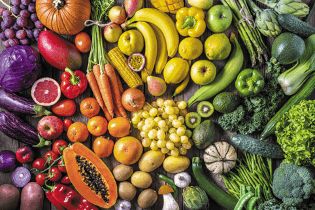
Arguably the most common source of antioxidants is fruits and vegetables. Berries, Citrus fruits, apples, grapes, watermelon, and pomegranate, among others, are all excellent sources of antioxidants.
Vegetables such as carrots, spinach, tomatoes, kale, and broccoli are some vegetables rich in antioxidants. Consuming this variety of colorful fruits and vegetables can provide your body with various antioxidants that can help protect against free radicals and reduce oxidative stress.
2.
Nuts and Seeds
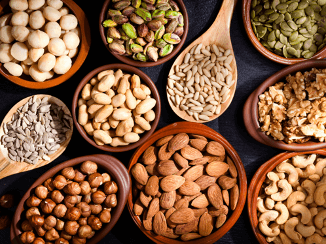
Moreso, nuts, and seeds are excellent sources of antioxidants. They are high in vitamin E and selenium. Vitamin E has been shown to protect the skin from free radical damage, and selenium may help increase the activities of the
antioxidant enzymes
in the body.
Almonds, walnuts, pistachios, and pecans are all high in vitamin E, whereas Brazil nuts are high in selenium. Chia, flax, and pumpkin seeds also have antioxidants, fiber, and good fats, aiding skin health.
3.
Herbs and Spices
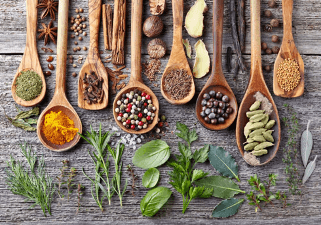
What comes to mind when you hear herbs and spices is flavoring. While this is true, herbs and spices do more than just flavor your food; they are also excellent sources of antioxidants. Turmeric, ginger, cinnamon, oregano, and rosemary are some antioxidant-rich herbs and spices.
Rich in bioactive compounds such as curcumin, gingerol, cinnamaldehyde, and rosmarinic acid, herbs, and spices have impressive antioxidant and anti-inflammatory properties. Incorporating herbs and spices into meals provides various health benefits to your skin.
4.
Supplements
Oral antioxidant supplements, such as those containing vitamins C, E, and beta-carotene, can enhance skin health. There are loads of available options to pick from. However, consult with your doctor before starting any antioxidant supplements.
Ways to Consume Antioxidants for Skin Health
1.
Incorporate Antioxidant-rich Foods into Your Diet
The first way to consume antioxidants is by incorporating them into your diet.
Consuming an antioxidant-rich diet helps support healthy skin from the inside. Berry, leafy greens, nuts, and whole grains are foods high in antioxidants that can shield the skin from free radical damage.
2.
Take Antioxidant Supplements
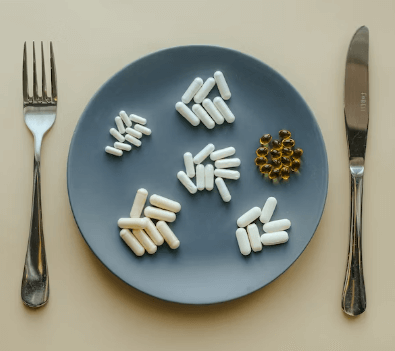
One of the ways to maintain the needed level of antioxidants required is a healthy diet; Always eat right. Your everyday diet must contain all the recommended daily vitamins and minerals in the right proportion. Sadly, that’s not always possible because most of our meals do not supply even the minimum requirements of daily vitamins and minerals.
The next available option is supplements. Vital supplements provide the body with the required and recommended daily dose of antioxidants. Interestingly,
approximately eight out of ten people take supplements
. And that’s because it’s not always easy to eat right. Hence, incredible supplements that will keep your skin healthy by fighting off radicals are your next available option. Vitamin C, vitamin E, and beta-carotene are popular antioxidant supplements that are commonly available.
Ensure you speak with a medical practitioner to help you decide on the best supplement.
3.
Topical Application of Antioxidants
Antioxidants are present in various skin care products, including serums, lotions, and oils that can be used topically. Topical antioxidants can aid in defending the skin against deterioration brought on by pollution, UV radiation, and other environmental stresses.
Additionally, they can aid in minimizing the appearance of age spots, wrinkles, and fine lines. Vitamins C and E, green tea extract, and coenzyme Q1 are popular, topical antioxidants.
Conclusion
As we have highlighted earlier in this article, free radicals are produced by everything we do. They are products of different metabolic processes in the body and exposure to specific triggers. Hence, it is almost impossible to prevent the production of these damaging, highly reactive molecules completely. However, we can mop off these radicals or neutralize their effects, which is why antioxidants are essential.
They prevent the actions of these free radicals and ensure the integrity of our wellness and health, including skin health. If you have been struggling with fine lines, wrinkles, hyperpigmentation, etc., consider boosting the level of antioxidants in your body.
However, ensure you speak with your doctor for professional recommendations.
References
-
Yoshida, T., Beck, L. A., & De Benedetto, A. (2022). Skin barrier defects in atopic dermatitis: From old idea to new opportunity. Allergology International: official journal of the Japanese Society of Allergology, 71(1), 3–13.
https://doi.org/10.1016/j.alit.2021.11.006
-
Lobo, V., Patil, A., Phatak, A., & Chandra, N. (2010). Free radicals, antioxidants, and functional foods: Impact on human health. Pharmacognosy Reviews, 4(8), 118-126.
https://doi.org/10.4103/0973-7847.70902
-
Pham-Huy, L. A., He, H., & Pham-Huy, C. (2008). Free Radicals, Antioxidants in Disease and Health. International Journal of Biomedical Science: IJBS, 4(2), 89-96.
https://www.ncbi.nlm.nih.gov/pmc/articles/PMC3614697/
-
Pizzino, G., Irrera, N., Cucinotta, M., Pallio, G., Mannino, F., Arcoraci, V., Squadrito, F., Altavilla, D., & Bitto, A. (2017). Oxidative Stress: Harms and Benefits for Human Health. Oxidative Medicine and Cellular Longevity, 2017.
https://doi.org/10.1155/2017/8416763
-
Meo, S. D., & Venditti, P. (2020). Evolution of the Knowledge of Free Radicals and Other Oxidants. Oxidative Medicine and Cellular Longevity, 2020.
https://doi.org/10.1155/2020/9829176
-
Al-Niaimi, F., & Zhen Chiang, N. Y. (2017). Topical Vitamin C and the Skin: Mechanisms of Action and Clinical Applications. The Journal of Clinical and Aesthetic Dermatology, 10(7), 14-17.
https://www.ncbi.nlm.nih.gov/pmc/articles/PMC5605218/
-
(2017). Antioxidants in dermatology. Anais Brasileiros de Dermatologia, 92(3), 356-362.
https://doi.org/10.1590/abd1806-4841.20175697
-
Lobo, V., Patil, A., Phatak, A., & Chandra, N. (2010). Free radicals, antioxidants and functional foods: Impact on human health. Pharmacognosy Reviews, 4(8), 118-126.
https://doi.org/10.4103/0973-7847.70902
-
Rahaman, M. M., Hossain, R., Herrera-Bravo, J., Islam, M. T., Atolani, O., Adeyemi, O. S., Owolodun, O. A., Kambizi, L., Daştan, S. D., Calina, D., & Sharifi-Rad, J. (2023). Natural antioxidants from some fruits, seeds, foods, natural products, and associated health benefits: An update. Food science & nutrition, 11(4), 1657–1670.
https://doi.org/10.1002/fsn3.3217
-
Bendich A. (1993). The physiological role of antioxidants in the immune system. Journal of dairy science, 76(9), 2789–2794.
https://doi.org/10.3168/jds.S0022-0302(93)77617-1
-
Pham-Huy, L. A., He, H., & Pham-Huy, C. (2008). Free Radicals, Antioxidants in Disease and Health. International Journal of Biomedical Science: IJBS, 4(2), 89-96.
https://www.ncbi.nlm.nih.gov/pmc/articles/PMC3614697/
-
(2017). Antioxidants in dermatology. Anais Brasileiros de Dermatologia, 92(3), 356-362.
https://doi.org/10.1590/abd1806-4841.20175697
-
Keen, M. A., & Hassan, I. (2016). Vitamin E in dermatology. Indian Dermatology Online Journal, 7(4), 311-315.
https://doi.org/10.4103/2229-5178.185494
-
Varani, J., Warner, R. L., Gharaee-Kermani, M., Phan, S. H., Kang, S., Chung, J. H., Wang, Z. Q., Datta, S. C., Fisher, G. J., & Voorhees, J. J. (2000). Vitamin A antagonizes decreased cell growth and elevated collagen-degrading matrix metalloproteinases and stimulates collagen accumulation in naturally aged human skin. The Journal of investigative dermatology, 114(3), 480–486.
https://doi.org/10.1046/j.1523-1747.2000.00902.x
-
de Jager, T. L., Cockrell, A. E., & Du Plessis, S. S. (2017). Ultraviolet Light Induced Generation of Reactive Oxygen Species. Advances in experimental medicine and biology, 996, 15–23.
https://doi.org/10.1007/978-3-319-56017-5_2
-
Michalak, M., Pierzak, M., Kręcisz, B., & Suliga, E. (2021). Bioactive Compounds for Skin Health: A Review. Nutrients, 13(1).
https://doi.org/10.3390/nu13010203
-
Tinggi, U. (2008). Selenium: Its role as antioxidant in human health.
Environmental Health and Preventive Medicine
,
13
(2), 102-108.
https://doi.org/10.1007/s12199-007-0019-4

 By myulikeadmin
By myulikeadmin



